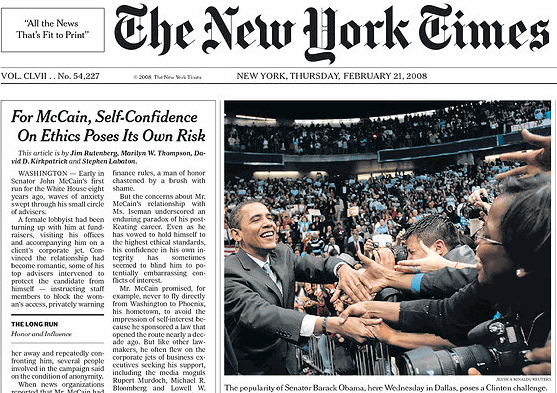Senate Committee Approves Syria AUMF
The Senate Foreign Relations Committee has, not surprisingly, approved the Authorization For Use Of Military Force in Syria:
WASHINGTON — A divided Senate Foreign Relations Committee on Wednesday approved an authorization of force against the Syrian government, setting up a showdown next week in the full Senate on whether President Obama should have the authority to strike.
The 10-to-7 vote showed bipartisan support for a strike, but bipartisan opposition as well. Republicans voting yes included Senators John McCain of Arizona, Bob Corker of Tennessee and Jeff Flake of Arizona. Democrats against the authorization included Senators Tom Udall of New Mexico and Chris Murphy of Connecticut. The Senate’s newest member, Edward Markey, Democrat of Massachusetts, voted present.
The panel had struggled to draft the resolution, with the senators deeply divided over how much force should be brought to bear to punish Syria’s government for the use of chemical weapons.
The committee’s bipartisan leaders pressed forward with a resolution limiting the duration and nature of military strikes, while Mr. McCain demanded more – not less – latitude for the military to inflict damage on the government of President Bashar al-Assad.
The approved resolution would limit strikes against the Syrian government to 60 days, with the possibility of 30 more days upon consultation with Congress, and it would specifically block the use of ground troops. But to retain the support of Mr. McCain, considered crucial to the authorization’s final passage, the committee toughened some of the language.
Before the vote, the balance of power appeared to lie with the interventionists. The panel set aside a resolution by Senator Rand Paul, a Kentucky Republican leading the opposition to the strikes, that would have declared that the president has the authority to act unilaterally only when the nation faces attack, then approved language by Mr. McCain and Senator Chris Coons, Democrat of Delaware, to toughen the resolution.
The McCain-Coons language noted “absent decisive changes to the present military balance of power on the ground in Syria, sufficient incentives do not yet exist” to force a political settlement of the Syrian civil war.
For the most part, the resolution that was approved is identical to the one that I discussed this morning, with the addition of the McCain and Coons Amendments noted above. What’s unclear is how it will far in the Senate, where it will require 60 votes to pass:
Senate leadership has decided to treat the Syria war authorization, approved by the Senate Foreign Relations Committee 10-7 Wednesday afternoon, like any other joint resolution. This means that it will be subject to a cloture motion, which requires 60 votes to pass, except in the unlikely event that all 100 senators give unanimous consent to move directly to a final vote.
“This joint resolution will be treated like any other joint resolution,” a Senate Democratic leadership aide told The Daily Beast. “That means we’ll have to move to proceed to the measure and without consent, it could face a 60 vote cloture vote on the motion to proceed.”
Final passage of the resolution will only require 50 votes, as with all legislation, but to get to the final vote, Senate Majority leader Harry Reid (R-NV) will have to corral 60 senators. Democrats currently have a 54-46 majority in the Senate. Three Republicans: Bob Corker (R-TN), John McCain (R-AZ), and Jeff Flake (R-AZ) voted for the measure Wednesday in committee while two Democrats: Chris Murphy (D-CT) and Tom Udall (D-NM) voted against. Sen. Ed Markey (D-MA) voted present.
“We’ll begin moving to this measure on Monday,” the leadership aide said. “Once on the bill we’ll debate it for as long as necessary before calling a final vote – or filing cloture to force a final vote.”
Also starting next week, the House will take up their version of the measure. That process began today as the House Foreign Affairs Committee heard testimony from Secretary of State Kerry, Secretary of Defense Hagel, and Joint Chiefs Chairman Dempsey. It’s unclear, though, if that committee will begin to consider a resolution to be sent to the House floor this week or whether it will wait until next week. In either case, there’s no doubt that next week is going to be very interesting.






I can’t wait to see the provisions of the House bill stating they support the bombing only if Obama defunds Social Security and Medicare.
@Doug Mataconis:
No, as pointed out in the article, it doesn’t need 60 votes to pass, it needs 60 votes for cloture. Just because the Republicans now are addicted to the filibuster doesn’t mean that a bill needs 60 votes to pass.
A bill could get 60 votes for closure and then fail to get the 50 or 51 votes needed to pass.
I agree with PJ, the final vote will probably be closer than the cloture vote. Democrats in particular may be willing to vote against the resolution, but could have a hard time filibustering a bill the President asked for.
Great, bc that last AUMF worked out so well. How many 1,000s of dead in Iraq in just the last six months. Not sure many more countries can take our assistance.
A real profile in courage, ole Ed is.